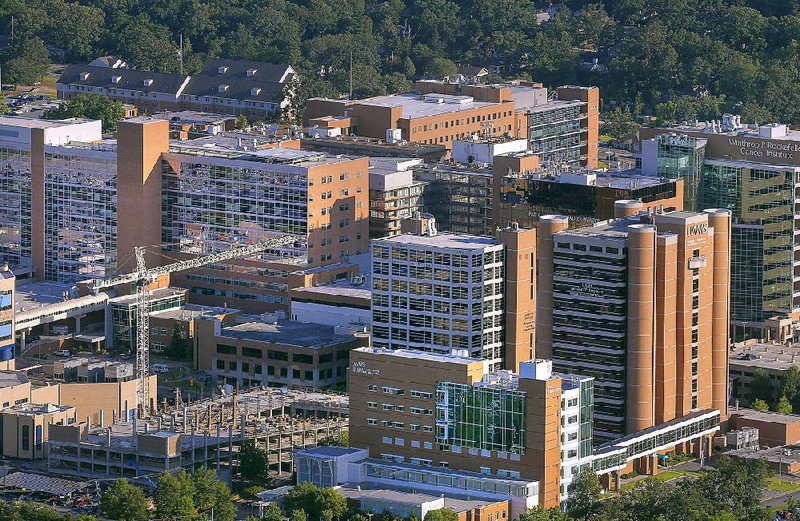FAYETTEVILLE -- A health care workforce proposal for Northwest Arkansas to train new and existing workers on "e-health technology" while also expanding medical residency positions is in the running to receive about $75 million in requested federal funding.
The U.S. Department of Commerce on Monday announced the plan led by the University of Arkansas for Medical Sciences as among 60 finalists in a $1 billion competition known as the Build Back Better Regional Challenge.
Each finalist receives approximately $500,000 in federal grant money and moves on to the competition's second phase as they seek to be among the 20-30 regional coalitions winning major grants of up to $100 million.
Patients have increasingly made use of online technology to see doctors during the ongoing pandemic, said Pearl McElfish, director of the UAMS Office of Community Health and Research.
There's been "an increased use of not just telemedicine, but e-health tools overall," McElfish said.
The UAMS-led pitch involves boosting telemedicine, home monitoring and wearable devices in the region through a new nursing degree and other training efforts as well as a "regional E-Health simulation center," according to a proposal summary.
McElfish said telemedicine visits will never replace all doctor appointments but described their use for follow-up consultations as "easier and more convenient" for patients.
A U.S. Department of Health and Human Services research report found that loosened restrictions on many types of telemedicine visits during the ongoing pandemic resulted in Medicare telemedicine visits increasing to nearly 52.7 million in 2020, up from about 840,000 a year earlier.
"There are numerous issues for policy makers to address as they consider permanent expansion of these Medicare waivers when the pandemic ends," the report stated.
McElfish said the proposal comes about after working with various health care providers in the region, including Washington Regional Medical System and Mercy Northwest Arkansas.
The proposal has its origins in "larger strategic efforts that UAMS and the Northwest Arkansas Council have been working on for several years," McElfish said, referring to a regional economic and workforce development group.
Many of the UAMS-led proposal's training efforts would focus "on unemployed and underemployed, diverse community members," the proposal states. A bachelor's degree nursing program with an "e-health" focus would seek to enroll 500 nurses over 10 years and aim to train those who already have a bachelor's degree. The proposal calls for a 15-month degree program.
The proposal also calls for training 1,000 others for "jobs in high demand now and in the future."
McElfish said these other jobs could be as radiology or ultrasound technology assistants, for example.
"Part of it is, just we need more nurses, we need other health professionals," McElfish said. "But in addition to that, we need people to be trained on the technology."
The plan also calls for increasing the number of residency training slots for new doctors and support for "entrepreneurial health care professionals" in developing new technology.
The proposal includes funding requests for different parts of the plan, including $37.1 million for graduate medical education, making it the most costly part of the plan -- even with $12.9 million in "matching" state funds.
McElfish said matching funds were a requirement in submitting the proposal.
She said the state, now with three medical schools, educates more medical doctors than there are available residency positions in Arkansas.
Residency training is a requirement, so doctors educated in Arkansas leave the state to go elsewhere, McElfish said.
In Northwest Arkansas, "we don't have some of the facilities we need," McElfish said, explaining how adding residency positions also involves having a certain amount of space for classroom and training areas, adding to the cost of increasing residency positions.
Some federal lawmakers have also been advocating for a significant increases in residency positions. U.S. Sen. John Boozman, R-Arkansas, has sought through legislation to expand graduate medical positions paid for through Medicare payments to hospitals.
Partners on the UAMS-led proposal include the Bentonville-based Walton Family Foundation and the Springdale-based Excellerate Foundation, listed as providing a combined $12.9 million in "matching" funds in support of efforts to train new health care workers. The proposal seeks $11.6 million in federal support for such general training efforts.
The proposal also requests $12 million in federal dollars for a simulation center, $10.3 million for a new program to support health care entrepreneurs, and $4 million to launch the new nursing degree program. For each request, there are "matching" funds of varying amounts to be provided by UAMS and others, including some "matching" funds from the University of Arkansas, Fayetteville in support of developing a health care technology and entrepreneurship program.
The federal Department of Commerce's Economic Development Administration developed the competitive grant challenge as a part of programs created under federal legislation known as the American Rescue Plan, passed earlier this year to provide coronavirus relief funding.
McElfish, until earlier this year the top administrator for the UAMS Northwest regional campus, is listed as the effort's regional economic competitiveness officer, according to the proposal document.
"All of the collaborators will come together over the next three months to submit a highly competitive application," McElfish said in a phone interview, adding that their submission could be a couple of hundred pages compared to their initial submission, which spanned five pages.
She said she was "confident" that the proposal will ultimately be selected as a major grant winner, and that she expects those grant winners to be named in August or September.

